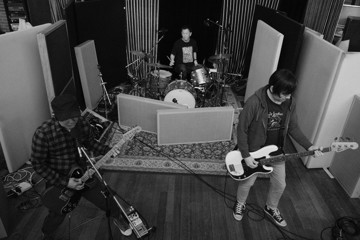Film Carew: Tusk, Obvious Child
Failure: It's just success rounded down
TUSK

On the way to watching Transcendence —this, keep in mind, coming before suffering through that sci-fi failure's endless 1-star tedium— yr ol' homie Film Carew was roped into a conversational parlour-game called: When Was The Last Time Johnny Depp Actually Made A Great Movie? It's a game that demands you claw through endless Pirates sequels, Tim Burton branding exercises, self-consciously ‘wacky’ adventures in self-consciously odd things, arthouse-blandeur prestige pictures, and cheque-cashing leading-man turns, all the way back to the 1990s, finally grasping hold of some distant totem like Donnie Brasco, Dead Man, or Ed Wood, before realising that the latter came out 20 fucking years ago.
It's hardly slowed his career: Depp's filmography stretches far and wide, and he's earned a certain cultural cachet as the Leading-Man-Unafraid-Of-Getting-Weird, creating crazy clowns with a vaudevillian flourish at odds with the method-acted earnestness or brand-managed vanity that usually comes with such macho movie-star terrain. But if Transcendence itself wasn't enough to revisit the notion that a film with Johnny Depp in it is a film that you should actually bother watching, then along comes Tusk.
Don't miss a beat with our FREE daily newsletter
Tusk is not a Johnny Depp joint; not by way of marketing, nor, really, by narrative. It is, instead, a Kevin Smith movie, which carries its own baggage: this the latest chapter in a career less chequered than constantly underwhelming. You can't play When Was The Last Time Kevin Smith Made A Great Movie, because he never has. With Silent Bob, the game is naming a single thing outside of Clerks' seminal role in the American independent pictures revolution that has mattered an artistic iota, carried clout beyond his ego-fellating phalanx of feverish fanboys.
Tusk, at least, finds the filmmaker endeavouring to author a bona fide cult film, a midnight movie that gleefully submits itself to the bizarre. It's found instant internet infamy, achieving meme as That Movie Where Michael Parks Turns Justin Long Into A Walrus. And, in that, Tusk quickly gets down to business: Long, moustachioed and self-entitled, is a douchey podcaster (whose partner-in-crime is the all-grown-up Haley Joel Osment, wearing a beard/mullet combo openly modelled on Smith himself) who sets out for rural Manitoba in search of a luckless, limb-lost kid from a viral video, and instead ends up taking the all-too-expected left-turn of a horror-movie victim.
Smith plays the early scenes strictly for laughs, if that's what you want to call generic 'Canada, eh?' cracks. Long is the smarmy city-slicker condescending to all who come across his path, blithely blowing towards the mother of all comeuppance in the form of Parks, a salty-sea-dog turned wheelchair-bound raconteur, who owes his very life to the walrus who lovingly rescued him from the wake of a shipwreck; and, thus, seeks to recreate that tender memory via psychotic butchery.

In its second act, Smith, surprisingly, makes interesting —and potentially promising— structural choices. As he intercuts between tender memories of pillow-talk with girlfriend Génesis Rodriguez and the horrors befalling Long in the narrative present, he's teasing at audience fidelity, expectation, and judgment; poking at the notion of whether Long is a figure of empathy or revulsion, whether he 'deserves' his victim’s fate. In a striking departure that arises from nowhere, and delivers the film's one true frisson of shock, Rodriguez, apropos of nothing prior, addresses the camera directly, full of pain and tears; though initially you've no idea whether she's confessing her darkest shame or rehearsing a monologue, and whether she's speaking to someone unseen off-screen or the audience directly.
It's kind of like Psycho, only if the whole final act was about Arbogast, and he was played as a mugging racist caricature by one of the biggest movie stars in cinema history.
But anything Tusk has going for it is scuttled the moment Depp comes on screen. He's playing a Québécois PI, which, in this case, means: 'funny' Frog accent, Clouseauesque clumsy, prosthetic nose, fake moustache, comic cross-eyes. It's low-rent sketch-comedy stuff, the kind of clichéd caricature that's howlingly unfunny in even the best of hands. At first, given it's Johnny Fucking Depp and all, you're sure that he must be about to go away; that this is some one-scene cameo, absurd yet ephemeral, tragic but disposable. But then the whole narrative actually pivots towards Depp, a sleuth long on Parks’ tail. It's kind of like Psycho, only if the whole final act was about Arbogast, and he was played as a mugging racist caricature by one of the biggest movie stars in cinema history.
It's car-crash viewing, a calamity that causes recalibration of the Johnny Depp's Awful Career meter. Tusk may be about a psychotic whale fetishist turning the dude from the Apple commercials into a Frankensteinian sea-creature via Human Centipede-esque home-butchery, but the real horrorshow is Depp's performance, which the faint-of-heart may only be able to watch peeking through their fingers.
OBVIOUS CHILD

One of my least-favourite opening acts in cinema is the rom-com's The Person Who Is About To Have Everything Wrong Happen To Them. It's standard-issue in commercial-fare —where well-adjusted women need to be humiliated so that audiences 'identify' with them, or sadsack men must be trodden on sufficiently that only a Manic Pixie Dream Girl can save them— but seems all the more noxious in low-budget films that imagine themselves to be 'edgy'.
Which is where Obvious Child comes in. No sooner has Jenny Slate blown onto screen in a burst of blue stand-up, than she's been dumped by her boyfriend in a public toilet, fired from her job, and lectured by her disapproving parents. After ten minutes, you're already at the fucking Embarrassing Drunken Phone Messages montage, with Slate filling the inbox of her ex in the cut-up results of grim improv. She's just as drunk when she meets blandly attractive, essentially character-free goyim Jake Lacy; they have sloppy sex, and, one "A Few Weeks Later" intertitle later, she's —sha-boing!— pregnant.
From there, Obvious Child meekly keeps to the beats of the rom-com, even if it weakly tries to kick against its own conservativeness with a meta-exchange about romantic comedies ("oh, I hate those!") on close. Its Will They Or Won't They extends not just to Slate and Lacy getting together before the final credit-roll, but whether they'll have that abortion, too. It's an interesting dramatic premise (one that the oft-maligned Girls handled with aplomb in a terrain-staking early episode), but Obvious Child itself is never actually that interesting. Instead, it's a film that wastes the presence of Gaby Hoffmann and turns, time-and-again, towards montages. Gillian Robespierre's screenplay feels like the first-draft of some aspiring Sundance applicant. With its two-dimensional supporting characters orbiting the lead, it's a movie that reflects only movies, that forsakes human truth for easy cliché.







